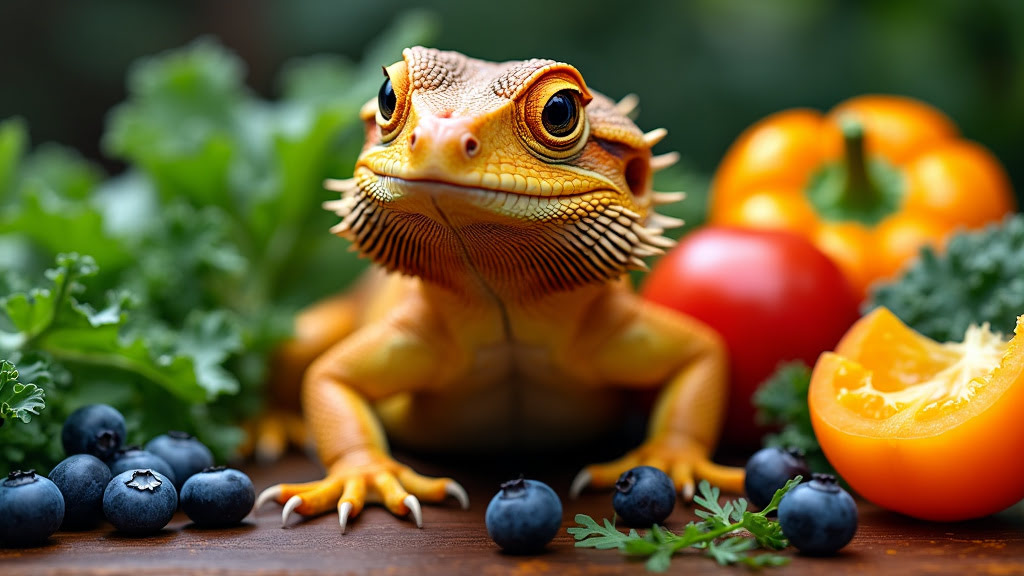Bearded dragons are really interesting pets that more and more people are choosing to have. They look unique and have fun personalities, which makes them great to have around. But to keep them healthy and happy, they need a good diet. This blog post will answer the big question: Can bearded dragons eat tomatoes?
What Bearded Dragons Eat in the Wild
To take good care of your bearded dragon, it’s important to know what they eat in the wild. Bearded dragons come from the dry areas of Australia, where they mainly eat a mix of insects, small animals, and plants. Their diet is diverse and rich, and we should try to copy this when they live with us.
At home, bearded dragons need a balanced diet that includes fresh vegetables, fruits, and live insects. My own beardies do well when their diet is similar to what they’d eat in the wild. It makes me happy to see them enjoy their balanced meals!
Nutrients in Tomatoes
Tomatoes are full of important vitamins and minerals that can be good for bearded dragons. They have Vitamin A, Vitamin C, potassium, and folate. These nutrients are important for their immune system, digestion, and overall health.
Even though tomatoes have good nutrients, they shouldn’t be a big part of your bearded dragon’s diet. I give my dragons tomatoes as a special treat—they seem to love the tangy taste, and it’s cute to watch them eat!
Possible Risks
But, like a twist in a story, feeding tomatoes to your bearded dragon comes with some risks. Tomatoes have oxalic acid, which can mess with calcium absorption. Calcium is very important for their bone health, and a lack of it can cause serious problems like metabolic bone disease.
Also, the acidity in tomatoes can upset your dragon’s stomach. They may feel bad or have digestive problems if they eat too many tomatoes. From what I’ve seen, my beardies can have softer stools or seem less active if they eat too much tomato.
Should Bearded Dragons Eat Tomatoes?
So, can bearded dragons eat tomatoes? The answer is yes, but be careful. Give tomatoes only once in a while, as a special treat. This way, your dragon can enjoy the benefits without the risks.
As a good rule, offer small pieces of tomato once every few weeks. Watch how your dragon reacts and talk to a vet if you see any bad effects. Remember, moderation is key!
Healthy Alternatives to Tomatoes
While tomatoes can be a treat, there are many other fruits and vegetables that are safer and more nutritious for your bearded dragon. Here are some great alternatives:
- Kale: Full of calcium and Vitamin A
- Butternut Squash: Great source of fiber and antioxidants
- Blueberries: Packed with vitamins and antioxidants
- Collard Greens: Excellent for providing calcium
- Bell Peppers: High in Vitamin C and other nutrients
I’ve found that adding these to my dragons’ diets helps them stay very healthy and active. It’s wonderful to see them enjoy a variety of foods!
How to Prepare Tomatoes for Your Bearded Dragon
If you choose to give your bearded dragon a tomato treat, it’s important to prepare it correctly. Follow these steps to make sure it’s safe:
Washing
Make sure to wash the tomato thoroughly to remove any pesticides and dirt.
Cutting into Small Pieces
Slice the tomato into small, easy-to-eat pieces to prevent choking.
Removing Seeds and Skins
Take out the seeds and skin, as they can be hard for your dragon to digest. Only give them the fleshy part.
From my experience, these simple steps make a big difference, so your pet can safely enjoy their treat.
Watching Your Bearded Dragon’s Health
Keep a close eye on your bearded dragon’s health. Look for signs of digestive issues, like changes in stool or appetite. These signs can show that their diet isn’t balanced.
Regular vet check-ups are important to catch any problems early. While I can give general advice based on my experience, always talk to a vet for specific health concerns. It’s like having a special pass to keep your pet healthy!
Conclusion
In short, bearded dragons can eat tomatoes, but only occasionally as a treat. The key to a healthy, happy dragon is providing a varied and balanced diet with safe vegetables and fruits.
Share your stories and questions—let’s start a fun discussion! Often, the best tips come from other happy pet owners. And don’t forget to subscribe to Dug’s Bugs for more advice and updates on how to care for your exotic pets. Your bearded dragon will appreciate it!
More Resources
- Trusted websites and care guides
- Recommended books about bearded dragon care
- Contact details for exotic pet vets
Call-to-Action:
We’d love to hear from you! Leave comments, share your experiences, and ask questions below. And don’t forget to subscribe to Dug’s Bugs for more tips and updates on caring for your exotic pet. Your scaly friend will thank you!

